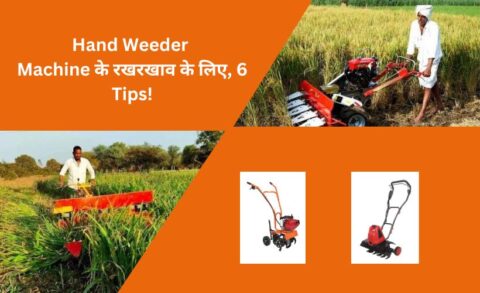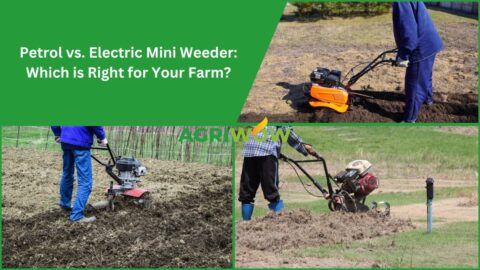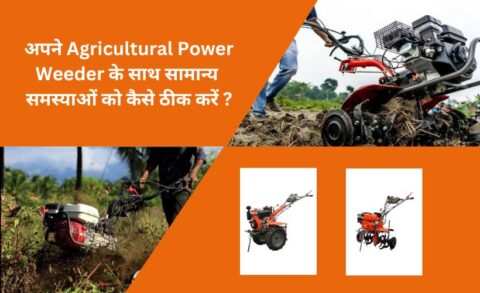Organic farming is steadily gaining popularity for its environmentally friendly practices and chemical-free produce. However, it often requires more manual labor compared to conventional farming, especially when it comes to weed control. This is where a mini power weeder can make a big difference. Compact, efficient, and easy to operate, this small machine is helping organic farmers increase productivity without compromising sustainability.
What Is a Mini Power Weeder?
A mini power weeder is a compact, motorized machine designed to remove weeds from the soil surface. Unlike large-scale agricultural equipment, it is lightweight and perfect for small to medium-sized farms. The machine works efficiently between rows of crops and around tight spaces, making it ideal for use in organic farms where chemical herbicides are avoided.
How a Mini Power Weeder Works?
A mini power weeder is designed to move smoothly between crop rows, using its rotating tines to churn and loosen the soil. This process effectively removes weeds while improving soil aeration without damaging nearby plants. The diagram below shows how the machine operates on the farm, making weeding easier, faster, and more precise.
Benefits of Using a Mini Weeder Machine in Organic Farming
1. Saves Time and Labor
Traditional weeding methods are time-consuming and require significant manual effort. A Mini Weeder Machine reduces this burden by performing the same task in a fraction of the time. Farmers can cover more ground quickly, allowing them to focus on other essential farming activities.
2. Improves Soil Health
Unlike herbicides that can affect soil microbiomes, a mini power weeder gently loosens the soil, improving aeration and water absorption. This helps maintain healthy soil conditions, which is critical for organic farming.
3. Enhances Crop Yield
Weeds compete with crops for nutrients, water, and sunlight. By efficiently removing these unwanted plants, the Mini Weeder Machine ensures that crops get the resources they need to grow. This directly contributes to better yields and healthier produce.
4. Cost-Effective and Low Maintenance
For small-scale farmers, investing in heavy machinery can be impractical. A mini power weeder is a budget-friendly alternative that offers great value. It is also easy to maintain, requiring less fuel and fewer repairs compared to larger equipment.
Comparing Mini Power Weeder with Hand Weeder Machine
| Feature | Mini Power Weeder | Hand Weeder Machine |
| Operation Type | Motorized / Automatic | Manual / Hand-operated |
| Speed & Efficiency | High – covers more area in less time | Low – slower and more time-consuming |
| Labor Requirement | Low – reduces physical effort | High – requires continuous manual effort |
| Suitability | Ideal for small to medium organic farms | Best for very small plots or garden use |
| Soil Health Impact | Improves aeration and water absorption | Minimal impact on soil structure |
| Cost | Higher initial investment but cost-effective long-term | Low cost but more labor-intensive |
| Maintenance | Requires fuel and regular servicing | Minimal maintenance |
| Weeding Accuracy | High – effective even between crop rows | Moderate – suitable for targeted weeding |
| Energy Consumption | Uses fuel or electricity | Relies completely on human effort |
| Productivity Boost | Significant productivity improvement | Limited to personal/manual effort |
Final Thoughts
For organic farmers looking to improve efficiency without compromising their eco-friendly practices, a mini power weeder is a smart investment. It offers the perfect balance between manual control and mechanical power, allowing farmers to save time, reduce labor costs, and improve crop health—all while staying true to the principles of organic agriculture.
Embrace modern tools like the Mini Weeder Machine and say goodbye to the exhausting days of hand-weeding. Your soil, crops, and body will thank you!
FAqs
Q1. What are the benefits of power weeder?
A power weeder saves time, reduces manual labor, and improves crop productivity by efficiently removing weeds. It also helps loosen the soil, allowing better water and air circulation, which benefits plant growth.
Q2. How can organic farming be helpful to small scale farming?
Organic farming supports small-scale farmers by reducing input costs, enhancing soil health, and producing high-quality, chemical-free crops. It also opens up premium markets that value natural and sustainable produce.
Q3. पावर वीडर के क्या फायदे हैं?
पावर वीडर समय और मेहनत दोनों की बचत करता है। यह खेत की मिट्टी को भुरभुरा बनाता है, खरपतवार हटाता है और फसल की उत्पादकता बढ़ाने में मदद करता है।
Q4. What is the purpose of a weeder?
The main purpose of a weeder is to remove unwanted weeds from the soil to prevent them from competing with crops for nutrients, sunlight, and water. It ensures healthier and higher-yielding plants.










